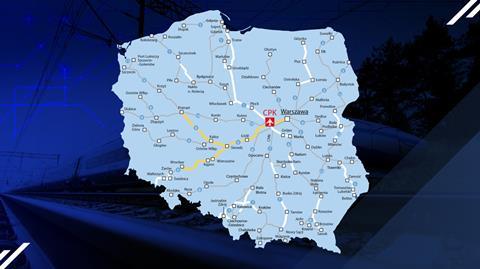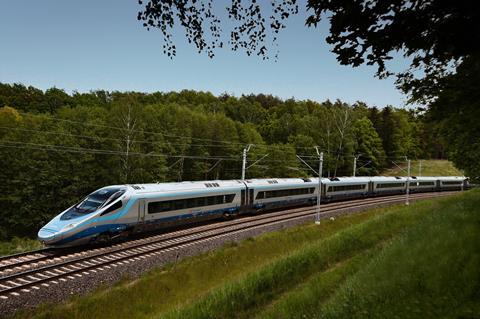The power industry has for years been discussing the implementation of 2x25 kV AC power for railway lines in Poland. However, it was not until the CPK investments that this process has actually got off the ground.

Following the positive results of the simulation, the company has already submitted applications to connect the traction substations to the power system.
There has been no slowing down in terms of the 2x25 kV AC power supply for the railway lines being built by Centralny Port Komunikacyjny. As a result of the agreement signed in mid-November last year with a design contractor, technical concepts have already been developed for all the substations that are to supply power for the Y-shaped highspeed railway line on the Warsaw - Łódź and Łódź - Wrocław sections.
That is a total of five facilities fed by the 400 kV and 220 kV networks. The traction simulations have also taken place, showing exactly what power demand the trains running should generate and how much energy they will consume. This has allowed, as the next step, the verification that the substations would not have a negative impact on the national power system.
Applications submitted, verification started. What next?
Having ensured that all the parameters (including the key voltage unbalance) were normal, CPK submitted applications for the five facilities with Polskie Sieci Elektroenergetyczne (PSE). Similar work is currently underway for facilities on the Poznań branch of the Y-shaped line, Sieradz-Poznan and on the other lines of the CPK high speed railway system.
The transmission system operator now has five months to review the applications, including drawing up its own expert opinion. This should be followed by the issuing of the connection requirements and then the conclusion of the utility connection agreement.
“This is going to open the next chapter of the partnership between CPK and PSE, namely the construction stage. The construction of the substations is going to be carried out by CPK, while the construction or expansion of the Grid Supply Point substations, which are at the tie-in point, is the task of the transmission operator,” explains Mateusz Malinowski, head of railway power supply projects at CPK.
The task is very ambitious because at the same time PSE is implementing its own, very extensive Transmission Network Development Plan (TNDP) for 2023-2032. It adapts the Polish network to the changes in the generation sector so that it can cope with the transmission of energy from, for example, offshore wind farms and nuclear power plant, as well as increasing the share of renewable energy sources (RES) at the expense of conventional ones.
The TNDP document is, without exaggeration, a “plan for the second electrification of Poland”. In November 2022, the TNDP also included works related to the connection of the CPK traction substations, and in April 2023, a new Regulation on the conditions of operation of the electricity system was issued, which - thanks to the joint work between PSE, CPK and the Ministry of Climate and Environment - included the provisions necessary for the operation of the 2x25 kV system substations.
“There is no denying that CPK’s activities have allowed the industry to move from years of theoretical discussions on the 2x25 kV system to its practical implementation,” added Mateusz Malinowski.

As he pointed out, this year’s reactivation of the scientific and technical conference ‘Modern Electric Traction’ under the aegis of the Polish Association of Transport Engineers and Technicians and the Faculty of Electrical Engineering of the Warsaw University of Technology has become its symbolic confirmation. A large part of the speeches given there discussed the technical aspects of the 2x25 kV system, which relate to the CPK’s actual intentions and are the result of analyses and solutions implemented as part of the design work commissioned by the company.
Moreover, the positive results of the design, legislative and other arrangements carried out by CPK for the 2x25 kV power supply on new railway lines have revived the debate about converting existing Polish railway lines, powered so far with 3 kV DC, to the new system.
Power supply system already known in Spain, France and the USA
The planned 2x25kV traction system, although not yet used in Poland, has been quite popular for many years.
The system is used on railway lines in Italy (High Speed Rail), in the UK (on most of the West Coast Main Line and Crossrail), in France (e.g. TGV), in Spain (most of the HSR lines), in the USA (Amtrak), as well as in Finland and Hungary. Currently, the Rail Baltica lines connecting Poland with the Baltic countries, north of the Polish-Lithuanian border, are also being designed with this system in mind.

















